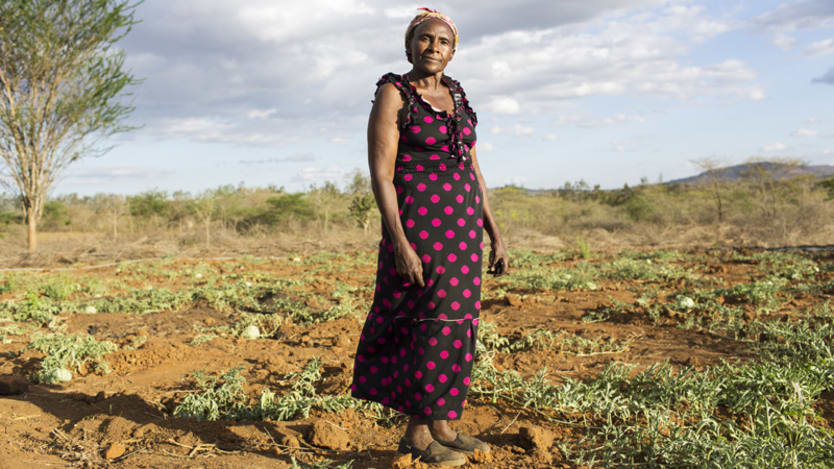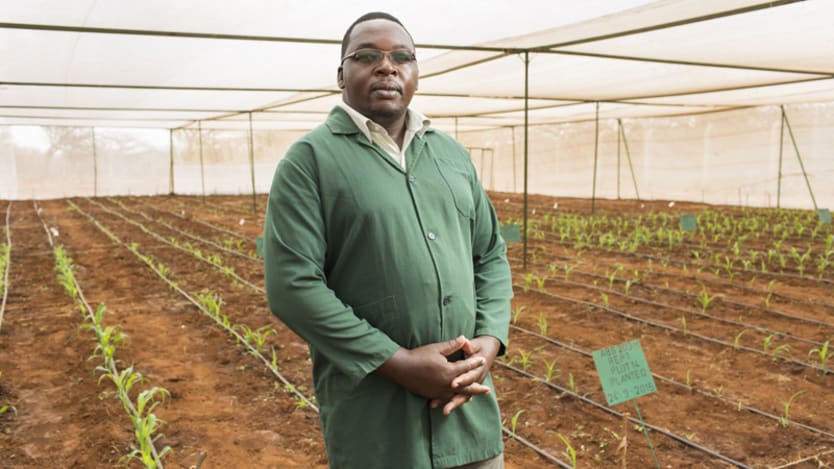
Up to half a million children around the world are going blind every year due to a lack of Vitamin A in their diets. According to the World Health Organization, Vitamin A deficiency, — which afflicts 250 million children worldwide — is the leading cause of preventable blindness in children and increases the risk of disease and death from severe infections. It is a public health problem in more than half the world’s nations, especially in Africa and Southeast Asia, affecting young children and pregnant women in low-income countries the hardest.
In Kenya, scientists are tackling this problem by developing biofortified sorghum, a staple crop that has been genetically modified to contain higher levels of Vitamin A. More than 300 million sub-Saharan Africans depend on sorghum as their primary calorie source. Its drought- and heat-tolerant properties mean it is a vital crop in drought-prone countries, where irrigation is not always accessible or affordable. Improving the nutritional level of staple crops can provide both food and nutritional security.
The Africa Biofortified Sorghum, or ABS, project is a public-private partnership established to tackle chronic Vitamin A deficiency in children, as well as improve levels of zinc and iron. If it gets commercial approval, it will be the first-ever biotech sorghum on the market. Like Golden Rice, biofortified sorghum is a cutting-edge approach to food security and quality.
In terms of tonnage, sorghum is Africa’s second most important cereal and because it originated in east Africa, Africans know how to plant, cook and eat it. Dr. Titus Magomere, a lecturer in biotechnology at Kenyatta University, is one of 70 scientists involved in the ABS project. He says it is the obvious crop to focus on.
“With the work that I am doing with biofortified sorghum, we are not trying to change the way people live, we are just improving the available nutrients in what they already have,” he said.

Dr. Magomere and his team have already increased the Vitamin A available in sorghum test plants.
“This is the first step,” he explained. “The second step has been to increase availability of iron and zinc and this has been done by reducing the levels of a protein that binds iron and zinc in the plants. We hope once the product is ready, a meal of sorghum, which will be available to the local farmers, will reduce nutritional deficiencies significantly.”
Farmers like Dorothy Warubua from Kenya are hoping to take these scientific advancements from the lab to the fields.
“With the work that I am doing with biofortified sorghum, we are not trying to change the way people live, we are just improving the available nutrients in what they already have.”
— Dr. Titus Magomere, lecturer in biotechnology at Kenyatta University“When I was young, many people grew sorghum, but then people were encouraged to grow other crops, and started looking down on sorghum,” she said.
Farmers were encouraged to grow maize in particular, but after a number of poor harvests, the Kenyan Ministry of Agriculture supported the reintroduction of sorghum.
“Sorghum needs very little rain. If you plant sorghum and maize at the same time, the sorghum will succeed but the maize often will not — so that's why we prefer sorghum,” says Warubua.
A reliable harvest also means a more secure source of nutrition and income for farmers and their families.
“You have to have a farmer who is going to harvest so that the people will eat,” emphasizes Warubua.
With Food Heroes like Warubua growing food for her community, and Magomere enhancing micronutrients in staple crops, the chronic nutritional deficiencies that haunt millions of African children can start to be addressed.
We’re looking for more farmers and scientists to tell their story. Help us uncover the men and women who are securing food supplies for future generations so we can share their story. Submit your Food Heroes’ stories or your own story here.
Join the Devex community and access more in-depth analysis, breaking news and business advice — and a host of other services — on international development, humanitarian aid and global health.
Search for articles
Most Read
- 1
- 2
- 3
- 4
- 5
